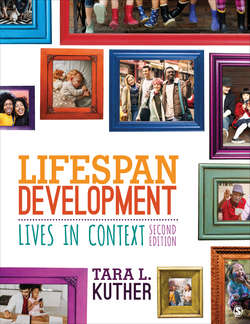Читать книгу Lifespan Development - Tara L. Kuther - Страница 99
На сайте Литреса книга снята с продажи.
Descriptions of Images and Figures
ОглавлениеBack to Figure
Physical: A young boy throws a baseball during a game.
Cognitive: A young girl completes a written assignment in the classroom.
Socioemotional: Two young girls walk together on their way home from school. One girl has her arm around the other.
Back to image
The city names shown are Little Ethiopia, Little Armenia, Cambodia Town, Little Tokyo, Little Bangladesh, Byzantine–Latino Quarter, next 3 exits, City of Los Angeles, Via Italia, Historic Filipinotown, Little Lithuania, Persian Square, Croatian Place, 9th street from Gaffey Street to Grand Avenue, Thai Town, Koreatown, El Salvador Corridor, and Chinatown.
Back to Figure
a. Continuous development. This is illustrated as an individual climbing a soft sloping hill. The continuing elevation represents increased development.
b. Discontinuous development. This is akin to an individual climbing stairs. Developmental progression is evident with each higher step, but the steps are discrete intervals.
Back to Figure
Length, in centimeters, is listed for specific ages. Data for ages and lengths are approximations.
0.95 to 1.05: 61 centimeters
1.05 to 1.15: 62 centimeters
1.2 to 1.3: 63.5 centimeters
1.3 to 1.45: 65 centimeters
1.5 to 1.6: 65.5 centimeters
1.6 to 1.65: 67 centimeters
1.65 to 1.75: 67.5 centimeters
1.75 to 1.8: 68 centimeters
1.8 to 1.85: 69 centimeters
1.85 to 2.0: 70 centimeters
2.0 to 2.5: 71 centimeters
Back to Figure
Illustration 1: A baby is being fed from a bottle and making sucking movements.
Illustration 2: While the baby is feeding from the bottle, a person touches the center of the baby’s forehead.
Illustration 3: When the baby is touched in the center of his forehead, he makes sucking movements, even though he is not being given a bottle.
Back to Figure
In the center of the map are three terms: person, behavior, and environment. Each term is connected to the other with a double-headed arrow.
Pointing to the person concept are two labels. One reads emotional, social, and cognitive abilities. The other reads knowledge, beliefs, and attitudes.
Pointing to the behavior concept is a label that reads verbal, motor, and social actions.
Pointing to the environment concept are two labels. One reads physical and social surroundings. The other reads family and friends.
Back to Figure
In the center of the map are three terms: person, behavior, and environment. Each term is connected to the other with a double-headed arrow.
Pointing to the person concept are two labels. One reads emotional, social, and cognitive abilities. The other reads knowledge, beliefs, and attitudes.
Pointing to the behavior concept is a label that reads verbal, motor, and social actions.
Pointing to the environment concept are two labels. One reads physical and social surroundings. The other reads family and friends.
Back to Figure
At the top of the image is the word Genetics. Extending from the left of this term is a large arrow that points to a list of developmental stages: conception, birth, childhood, adolescence, and adulthood.
Extending from the right of the term Genetics are two smaller arrows. One points to the label Epigenetic factors. The other points to the label Environment. Extending from both of these labels are two larger arrows that point to the list of development stages.
A note along the arrow pointing to Environment reads Genetic susceptibility to environmental effects.
Back to image
1. No poverty
2. Zero hunger
3. Good health and well-being
4. Quality education
5. Gender equality
6. Clean water and sanitation
7. Affordable and clean energy
8. Decent working and economic growth
9. Industry, innovation, and infrastructure
10. Reduced inequalities
11. Sustainable cities and communities
12. Responsible consumption and production
13. Climate action
14. Life below water
15. Life on land
16. Peace, justice, and strong institutions
17. Partnerships for the goals
